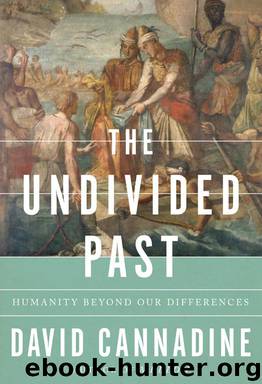The Undivided Past by David Cannadine

Author:David Cannadine
Language: eng
Format: mobi, epub
ISBN: 9780307957375
Publisher: Knopf Doubleday Publishing Group
Published: 2013-04-08T23:00:00+00:00
THE RISE OF RACE
Unlike religious or class identities, which derived from and depend on a limited number of sacred texts, namely the Bible and the writings of Marx and Engels, racial identities have been underpinned (or undermined) by a more varied corpus of (often contradictory) writings. This helps explain why historians cannot agree when race became an important form of collective perception, identity, ranking, and antagonism.9 But it seems generally accepted that no such way of conceptualizing and contrasting human aggregations was widespread in the ancient world. To be sure, ancient Greece and the Roman Empire were societies built on slavery, but there were no clear-cut physical differences, such as skin color, distinguishing slaves from masters: servitude was a matter of individual personal history rather than collective racial identity.10 The Greeks may have believed they were better than all other peoples, but they made no attempt to rank non-Hellenes in a hierarchy of superior or inferior types. And while black Africans, usually referred to as Ethiopians, were well known in ancient times, they were not regarded as lesser beings by virtue of their skin color. Neither the Greeks nor the Romans thought that way about the many peoples living in the Mediterranean, in Asia Minor, and in North Africa, and later attempts to impute to Plato and Aristotle a nineteenth-century view of racial identities and rankings, anticipating the opinions of Robert Knox and his contemporaries, were ahistorical and anachronistic.11
The Bible was also largely color-blind and “oblivious of the fact of racial difference”: Old Testament descriptions of encounters between different tribes and peoples were generally devoid of racial connotations, and a fundamental tenet of Christian teaching was the essential unity of humankind, for as was made plain in the Book of Genesis, everyone was descended from the two originally created parents, Adam and Eve. This doctrine of a common humanity was frequently and brutally set aside during religious wars and persecutions, but the injunction that “God hath made of one blood all nations of men for to dwell on all the face of the earth” remained deeply embedded.12 This was certainly the view of Saint Augustine:
Whoever is anywhere born a man, that is, a rational, mortal animal, no matter what unusual appearance he presents in colour, movement, sound, nor how peculiar he is in some part, or quality of his nature, no Christian can doubt that he springs from that one protoplast … if they are human, they are descended from Adam.13
Such anatomical differences as skin pigmentation were merely superficial, and since all human beings originated from the same stock, they were all equal in the sight of God. The fourth-century Christian author Lucius Lactantius put this well:
All men are begotten alike, with a capacity and ability of reasoning and feeling, without preference of age, sex, or dignity.… God, who produces and gives breath to men, willed that all should be equal.… In his sight, no one is a slave, no one a master; for all have the same father, by an equal right we are all children.
Download
This site does not store any files on its server. We only index and link to content provided by other sites. Please contact the content providers to delete copyright contents if any and email us, we'll remove relevant links or contents immediately.
| Archaeology | Essays |
| Historical Geography | Historical Maps |
| Historiography | Reference |
| Study & Teaching |
Underground: A Human History of the Worlds Beneath Our Feet by Will Hunt(12097)
Sapiens by Yuval Noah Harari(5370)
Navigation and Map Reading by K Andrew(5156)
The Sympathizer by Viet Thanh Nguyen(4390)
Barron's AP Biology by Goldberg M.S. Deborah T(4150)
5 Steps to a 5 AP U.S. History, 2010-2011 Edition (5 Steps to a 5 on the Advanced Placement Examinations Series) by Armstrong Stephen(3733)
Three Women by Lisa Taddeo(3433)
Water by Ian Miller(3185)
The Comedians: Drunks, Thieves, Scoundrels, and the History of American Comedy by Nesteroff Kliph(3079)
Drugs Unlimited by Mike Power(2594)
A Short History of Drunkenness by Forsyth Mark(2297)
DarkMarket by Misha Glenny(2212)
And the Band Played On by Randy Shilts(2209)
The House of Government by Slezkine Yuri(2206)
The Library Book by Susan Orlean(2069)
Revived (Cat Patrick) by Cat Patrick(1991)
The Woman Who Smashed Codes by Jason Fagone(1973)
The Absolutely True Diary of a Part-Time Indian by Sherman Alexie(1913)
Birth by Tina Cassidy(1903)
